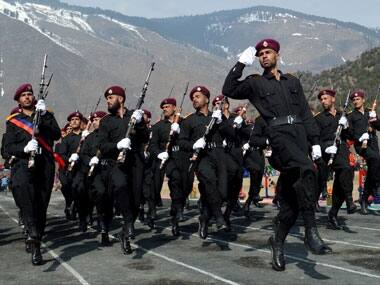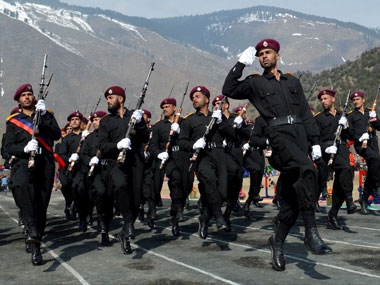Srinagar: It was a sleepy Friday evening last week when two men in traditional Kashmiri pherans walked out of a single storey mosque, having finished their prayers, into a dark lane in the troubled town of Sopore, almost 50 kilometres from Kashmir’s capital of Srinagar. They had covered some distance on foot when some unidentified gunmen shot at one of them, at point blank range. Waseem Ahmad Malla, 25, a student of Islamic Studies and an avid footballer, was killed on the spot. [caption id=“attachment_140719” align=“alignleft” width=“380”]  A contingent of Jammu and Kashmir police during a passing out parade in Sheeri on Monday where Chief Minister Omar Abdullah said he would talk to the Centre about the removal of AFSPA. Photo by Shahid Tantray[/caption] His father Mehrajudin Malla, who was walking 10 metres ahead of him, stood in shock. Almost 20 minutes later, doctors at a nearby hospital declared Waseem ‘brought dead’. He had been shot in head twice. Mehrajudin failed to even point out which direction the fire had come from, owing to the darkness. A framed picture of young Waseem hangs in his room, he’s wearing a white shirt and blue jeans in it, his smiling face a reminder of how uncertain life still is in Kashmir. “He would have completed his masters this year. A bright student in my class and always ready with a helping hand for others,” is how one of his teachers at the Islamic University of Science and Technology remembered him. But Waseem’s killing has gone almost unnoticed in Kashmir. No one knows whether he was killed for any alleged links with security agencies or any alleged sympathy for militants. There is no shock, no anger, nor any frustration, and no condemnations. It was another of those hundreds of killings gone unnoticed and rarely talked about in Kashmir. In Sopore, killings like Waseem’s are merely statistics for either side. The police in Sopore say they are investigating the case and are not ruling out the involvement of militants. “We are looking at every possible angle but there is a strong possibility that he was killed by militants,” SSP Sopore, Abdul Qayoom, said. But what could have been the motive? That he doesn’t know. It is killings like these that make peace in Kashmir so fragile, and the fragility of this peace is expected to only worsen this year. However, Chief Minister Omar Abdullah believes he has a case to make to the Centre for withdrawal of the AFSPA. Speaking at the passing-out parade at the Police Training Centre Sheeri in North Kashmir’s Baramulla town on Monday, Abdullah said, “Some people had expressed apprehensions about 2014, that is why I have said let the first half of the year pass, then I will surely take up the issue of AFSPA with the Central government." Abdullah does not believe that the United States’ troop withdrawal from Afghanistan will impact Kashmir. Hours after the CM made his renewed his pitch for the withdrawal of AFSPA, the army and Jammu and Kashmir police in a joint operation killed seven militants in the forests of Dardpora area of Kupwara late on Monday. That appears to lend credence to claims of top generals who believe that militant activity in Kashmir has increased in the first two months of 2014. Lt Gen Gurmit Singh, commander of Srinagar-based 15th Corps, says last year the first terrorist was killed in April, but this year, it happened on Jan 7. “Militant activity has been higher in beginning of 2014. So far, we have eliminated 24 terrorists of whom 11 have been killed and 13 were apprehended. All the 13 arrested guerrillas are locals,” Singh said at a press conference in Srinagar on Saturday. He said, with emphasis, that although his forces were prepared, they faced multiple challenges during this year as there might be “increased infiltration attempts in view of the depleting militant leadership and the forthcoming elections”. Singh’s view is also mirrored in a booklet titled “Brief Statement on Activities & Achievements of Ministry of Defence during 2013”, tabled in Parliament recently. The report says the situation in the valley remains fragile with Pakistan’s “proxy war” continuing in the state amid a rise in incidents of ceasefire violations and terror infrastructure remaining intact in Pakistan. Last year the security forces had struggled to contain militancy against a manifold increase in their casualties. In 1,965 counter insurgency operations 61 militants were killed. On the other hand the number of the attacks on the forces had nearly doubled from 17 in 2012 to 31 in 2013. In the same year 28 Army and paramilitary personnel, 14 men of Jammu and Kashmir police and three special police officers were killed. There is no doubt that the number of militants and their attacks on security forces has drastically decreased. But security agencies are bracing themselves for the worst possibilities for this crucial year. As no one wants to see a repeat of 2013, when the number of security forces killed matched the number of militants killed during the year. If there is any message that can be extracted from the happenings over the past two months, it is the minimization of the forces’ casualties although militant organizations have suffered large casualties. Back in Sopore, while sitting on a red Iranian carpet inside his house holding a picture of his son, Mehrajudin says he may never come to know about the real identity of the killers of his son, but he knows that his son is just another number in Kashmir’s war without end.
Hours after the CM made his renewed his pitch for withdrawal of AFSPA, the army and Jammu and Kashmir police killed seven militants in the forests of Dardpora area of Kupwara late on Monday
Advertisement
End of Article


)

)
)
)
)
)
)
)
)



